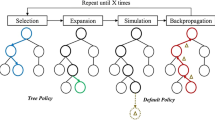Abstract
We present in this work a hierarchical approach for generating alternatives for production planning in a generic floor shop problem within the environment of Flexible Manufacturing Systems (hereafter, FMS). Briefly, the problem can be stated as follows: Given the resources of a FMS and the characteristics of the parts to be produced along a planning horizon, obtain the loading ordering of the parts in the FMS, the execution ordering of the operations and the processing route of each part (i.e., the working stations where each operation is to be executed), such that the production and transport costs are minimized and the modules workload is levelized. The problem is decomposed into three subproblems which are arranged in a hierarchy; a variety of models is presented, as well as the input/output relations that allow to integrate them; we also propose some algorithmic ideas to exploit the special structure of the problem. Computational experience is reported.
Similar content being viewed by others
References
J.C. Ammons, C.B. Lofgren and L.F. McGinnis, A large-scale work station loading problem, in: Stecke, K.E. and R. Suri (eds.) (1984) 249–255.
C. Abraham, B. Dietrich, S. Graves, W. Maxwell and C. Yano, A research agenda for models to plan and schedule manufacturing systems, Report RC-11329, IBM Research, Yorktown Heights, NY, 1985.
E. Balas and N. Christofides, A restricted Lagrangian approach to the traveling salesman problem, Mathematical Programming 21 (1981) 19–46.
E. Berrada and K.E. Stecke. A branch and bound approach for machine loading in Flexible Manufacturing Systems, working paper 329-b, Graduate School of Business Administration, University of Michigan, Ann Arbor, Michigan, See also: Management Science 32 (1986) 1316–1334.
C.S. Carpaneto, S. Martello and P. Toth, Linear assignment problems, School of Combinatorial Optimization, Rio de Janeiro, 1985.
E.K. Chakravarty and A. Shtub, Selecting parts and loading flexible manufacturing systems, in Stecke, K.E. and R. Suri (eds.) (1984) 284–289.
A. Chatterjee, M.A. Cohen, W.L. Maxwell and L.W. Miller, Manufacturing flexibility: models and measurement, in Stecke, K.E. and R. Suri (eds.) (1984) 49–64.
H. Crowder, E.L. Johnson and M. Padberg, Solving large-scale zero-one linear programming problems, Operations Research 31 (1983) 803–834.
H. Engelke, J. Grotrian, C. Scheuing, A. Schmackpfeffer, W. Schwarz, B. Solf and J. Tomann, Integrated manufacturing modeling system, IBM J. of Research and Development 29 (1985) 343–355.
L.F. Escudero, Special sets in mathematical programming, in:Applied Numerical Modeling, eds. E. Alarcon, and C. Brebbia (Pentech Press, London, 1979) 535–551.
L.F. Escudero, An integrated approach for generating production planning models in FMS, working paper, IBM GMTC, Sindelfingen, FRG, 1986.
L.F. Escudero, An (inexact) algorithm for the sequential ordering problem, European J. of Operational Research (1988, to appear).
L.F. Escudero, An inexact algorithm for part input sequencing and scheduling with side constraints in FMS, Intern. J. of Flexible Manufacturing Systems (submitted for publication).
A. Freville and G. Plateau, Heuristics and reduction methods for multiple constraints 0–1 linear programming problems, European J. of Operational Research 24 (1986) 206–215.
T.J. Greene and R.P. Sadowski, A mixed integer program for loading and scheduling multiple flexible manufacturing cells, European J. of Operational Research 24 (1986), 379–386.
M. Grotschel, M. Junger and G. Reinelt, A cutting plane algorithm for the linear ordering problem, Operations Research 34 (1984) 1195–1220.
M. Guignard and K. Spielberg, Propagation, penalty improvement and use of logical inequalities, Mathematics of Operations Research 25 (1977) 157–171.
T.G. Gunn, The mechanization of design and manufacturing, Scientific American 247 (1982) 870–108.
K. Hoffman and M. Padberg, LP-based combinatorial problem solving, Annals of Operations Research 5 (1986) 145–194.
IBM. 1975. MPSX/370, Mathematical Programming System Extended/370 and MIP/370, Mixed Integer Programming/370; Ref. manuals SH19-1095 and SH19-1099. Introduction to the Extended Control Language, 1978, Ref. manual SH19-1147). Newletter, 1979, SN19-1132.
E.L. Johnson, M.M. Kostreva and U. Suhl, Solving 0–1 integer programming problems arising from large-scale planning models, Operations Research 33 (1985) 803–819.
R.M. Karp and J.M. Steele, Probabilistic analysis of heuristics, in:The Traveling Salesman Problem, A Guided Tour of Combinatorial Optimization, eds. E.L. Lawler, J.K. Lenstra, A.H.G. Rinnooy-Kan and B. Shmoys (Wiley, NY, 1985) 181–205.
A. Kusiak Integer programming approach to the process planning problem, Intern. J. of Advanced Manufacturing Technology 1 (1985) 73–83.
A. Kusiak and G. Finke, Modeling and solving the flexible forging module scheduling problem, Working paper 85/06, Dept. of Mechanical and Industrial Engineering, University of Manitoba, Winnipeg, Canada, 1985.
S. Martello, An enumerative algorithm for finding Hamiltonian circuits in a directed graph, ACM Transactions on Mathematical Software 9 (1983) 131–138.
C. Sandi, Solution of the machine loading problem with binary variables, in:Combinatorial Programming: Methods and Applications eds. B. Roy, (D. Reidel, Dordrecht-Holland, 1975) 371–378.
K.E. Stecke (1983), Formulation and solution of nonlinear integer production planning problems for flexible manufacturing systems, Management Sciences 29 (1983) 273–288.
K.E. Stecke A hierarchical approach to solving machine grouping and loading problems of flexible manufacturing systems, European J. of Operational Research 24 (1986) 369–378.
K.E. Stecke and T.L. Morin, Optimality of balanced workload in flexible manufacturing systems, European J. of Operational Research 20 (1985) 68–82.
K.E. Stecke, and R. Suri (eds.)Flexible Manufacturing Systems: Operations Research Models and Applications, University of Michigan, Ann Arbor, 1984.
K.E. Stecke and F.B. Talbot, Heuristic loading algorithms for flexible manufacturing systems,Proc. 7th Intern. Conf. on Production Research, Windsor, Ontario, 1983.
T.J. Van Roy and L.A. Wolsey, Solving mixed integer programming problems using automatic reformulation, Operations Research 25 (1987) 45–57.
C.K. Whitney and T.S. Gaul, Sequential decision procedures for batching and balancing in FMSs, in Stecke, K.E. and R. Suri (eds.) (1984) 243–284.
R.J. Wittrock, Scheduling algorithms for flexible flow lines, IBM J. of Research and Development 29 (1985) 401–412.
R.J. Wittrock, An adaptable scheduling algorithm for flexible flow lines, Report RC-11387, IBM Research Division, Yorktown Heights, NY, 1986.
Author information
Authors and Affiliations
Rights and permissions
About this article
Cite this article
Escudero, L.F. A production planning problem in FMS. Ann Oper Res 17, 69–103 (1989). https://doi.org/10.1007/BF02096599
Issue Date:
DOI: https://doi.org/10.1007/BF02096599




